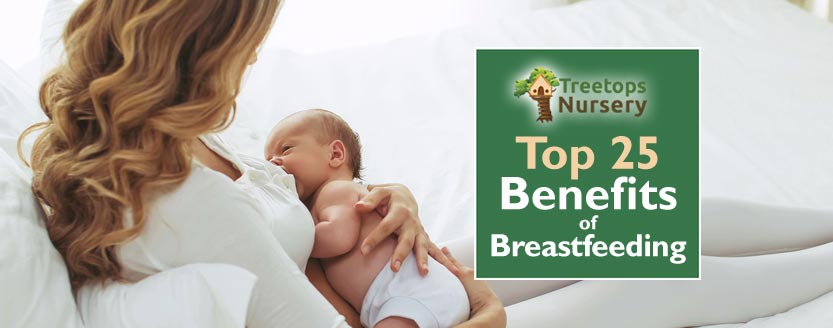
When it comes to breastfeeding vs. formula milk, there’s a good reason why the phrase ‘Breast is Best’ holds true. In fact, there are many benefits to breastfeeding including several for both baby and mother. Here are our top twenty-five:
15+ Breastfeeding Benefits for Babies
 Breast milk is nature’s totally natural food for newborns and little ones, containing nothing artificial or added.
Breast milk is nature’s totally natural food for newborns and little ones, containing nothing artificial or added.- It’s tailored perfectly to the needs of the growing infant, adapting to their needs as they grow.
- It passes on antibodies straight to the newborn baby.
- It contains everything the baby needs for healthy development, including all the right proteins, vitamins, fats and even hormones.
- Breast milk also contains long-chain polyunsaturated fatty acids, which are essential for the baby’s developing brain.
- Data suggests that at least 6 months of breastfeeding protects against the possible development of childhood leukaemia.
- It’s also likely to protect against the development of Sudden Infant Death Syndrome (‘SADS’).
- Premature babies are also more protected against the bowel disorder Necrotising Enterocolitis (‘NEC’), which can be potentially serious.
 Babies are also more protected against asthma if they have been breastfed.
Babies are also more protected against asthma if they have been breastfed.- Breast milk protects children against allergic rhinitis.
- Children are less likely to suffer from severe eczema, wheezing and respiratory infections if they were breastfed as babies.
- Children who were breastfed as babies are also statistically less likely to suffer from ear infections.
- Evidence also suggests that continuing with some breast milk once a child starts weaning onto solids (usually around the age of 6 months) may protect them against the development of some food allergies.
- Breastfed babies are also less likely to develop gastrointestinal infections and diarrhoea.
- Many of the benefits of breastfeeding during early childhood actually continue to benefit the individual once they’re adults, which is remarkable.
10+ Breastfeeding Benefits for Mums
 Breastfeeding a baby reduces the chance of mothers developing Type 2 Diabetes.
Breastfeeding a baby reduces the chance of mothers developing Type 2 Diabetes.- Mothers who breastfeed are less likely to develop breast cancer.
- They’re also less likely to develop ovarian cancer.
- They’re less likely to develop osteoporosis.
- Breastfeeding mums are also less likely to develop cardiovascular disease.
- Their weight is also more likely to return to its normal level following pregnancy if they breastfeed.
- Breastfeeding a baby reduces the chance of mothers becoming obese.
- The uterus of mothers who breastfeed also returns to its normal size far sooner.
- Periods return later in mums who breastfeed, which could help with family planning.
- Last but not least, breastfeeding allows closer bonds to quickly form between baby and mother.
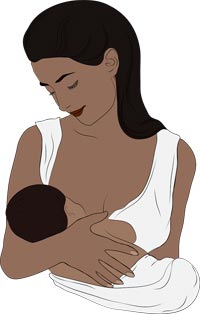 Our top 25 benefits of breastfeeding really only scratch the surface. Breastfeeding and breast milk have many more benefits including anything from saving money and being more convenient (nothing needs buying or preparing) to being better for the planet. With breast milk, there’s no packaging to throw away and it’s a totally sustainable food source, direct from nature. Incredible when you think about it.
Our top 25 benefits of breastfeeding really only scratch the surface. Breastfeeding and breast milk have many more benefits including anything from saving money and being more convenient (nothing needs buying or preparing) to being better for the planet. With breast milk, there’s no packaging to throw away and it’s a totally sustainable food source, direct from nature. Incredible when you think about it.
Milk at Treetops Nursery, Willesden
Parents/guardians of babies and children at Treetops Nursery are welcome to supply their own preferred milk, whether that’s bottled breast milk or specific types of formula milk. If supplying the latter, there’s no need to make it up as we can prepare it for your child, so that it’s more freshly prepared and the right temperature etc. Please do label your child’s milk/bottles/etc. with your child’s name, though. It’s also best to supply them in a cool bag, please, also clearly labelled. Nursing mums who wish to breastfeed their child at the nursery are also offered an appropriate, private space in which to do so.
Our Outstanding Nursery in Willesden, near Harlesden & Kensal Green
 Are you looking for the best nursery for your child? If so, you’ll find Treetops Nursery very hard to beat. Our nursery is in Willesden, so is near to Willesden Green, Kensal Green and Harlesden in London NW10. It’s suitable for babies, toddlers and children aged up to five. Fees are competitive, facilities and equipment are excellent and we received a glowing report from Ofsted. If you’re potentially interested in a nursery place for your baby or child while some are still available, please get in touch. We’ll be happy answer questions and show you/your child around too. Please select from the following as preferred:
Are you looking for the best nursery for your child? If so, you’ll find Treetops Nursery very hard to beat. Our nursery is in Willesden, so is near to Willesden Green, Kensal Green and Harlesden in London NW10. It’s suitable for babies, toddlers and children aged up to five. Fees are competitive, facilities and equipment are excellent and we received a glowing report from Ofsted. If you’re potentially interested in a nursery place for your baby or child while some are still available, please get in touch. We’ll be happy answer questions and show you/your child around too. Please select from the following as preferred:
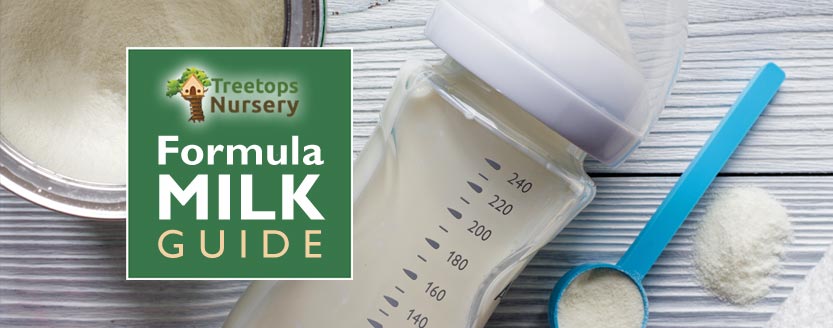
 Last month, we mentioned what a huge topic formula milk is. So, in this post, we thought we’d explore all the different types of milk available to infants in the UK.
Last month, we mentioned what a huge topic formula milk is. So, in this post, we thought we’d explore all the different types of milk available to infants in the UK. Baby and infant formula milk comes ready-made in liquid form or as a powder that needs to be carefully and hygienically made up. The liquid variety is usually the more expensive of the two and needs to be used sooner, due to its shorter shelf life. Whichever is used, labels should be carefully checked to ensure suitability for the age of the particular baby/infant in question.
Baby and infant formula milk comes ready-made in liquid form or as a powder that needs to be carefully and hygienically made up. The liquid variety is usually the more expensive of the two and needs to be used sooner, due to its shorter shelf life. Whichever is used, labels should be carefully checked to ensure suitability for the age of the particular baby/infant in question. Comfort Formula is another type of formula milk based on cows’ milk, but the milk proteins it contains are already partially broken down (partially hydrolysed). It is marketed as being easier for the infant to digest and, as such, a formula milk that will reduce the chance of constipation or colic. However, there is no evidence to back up such claims. It’s suitable from birth but parents should ask for advice from their Health Visitor or midwife before giving their baby this type of milk, and certainly not use it if their infant is allergic to cows’ milk.
Comfort Formula is another type of formula milk based on cows’ milk, but the milk proteins it contains are already partially broken down (partially hydrolysed). It is marketed as being easier for the infant to digest and, as such, a formula milk that will reduce the chance of constipation or colic. However, there is no evidence to back up such claims. It’s suitable from birth but parents should ask for advice from their Health Visitor or midwife before giving their baby this type of milk, and certainly not use it if their infant is allergic to cows’ milk. From the age of 1: your baby can move onto drinking whole pasteurised cows’ milk as their main drink (or alternatively sheeps’ or goats’ milk so long as it’s also pasteurised) as part of a healthy, balanced diet. It should not be given to children before they’re one because it does not contain enough iron.
From the age of 1: your baby can move onto drinking whole pasteurised cows’ milk as their main drink (or alternatively sheeps’ or goats’ milk so long as it’s also pasteurised) as part of a healthy, balanced diet. It should not be given to children before they’re one because it does not contain enough iron.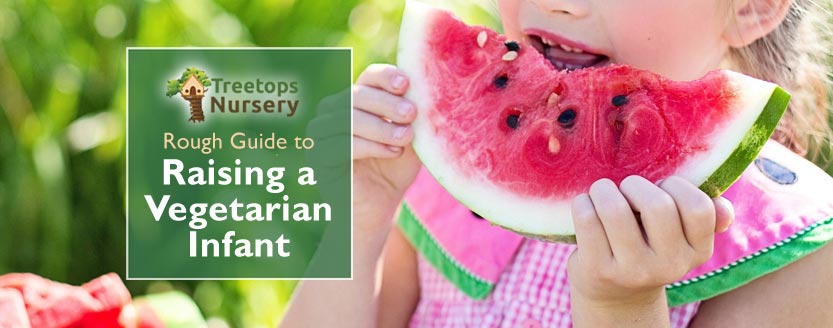
 More and more parents are bringing up youngsters as vegetarians these days, so we thought we’d put together a rough guide to raising babies, toddlers and preschoolers as vegetarians. When doing so, certain considerations will need to be made, including ensuring that meals are nutritious, containing all the necessary food groups, vitamins and minerals needed by the very young.
More and more parents are bringing up youngsters as vegetarians these days, so we thought we’d put together a rough guide to raising babies, toddlers and preschoolers as vegetarians. When doing so, certain considerations will need to be made, including ensuring that meals are nutritious, containing all the necessary food groups, vitamins and minerals needed by the very young. The good news is that formula milk that’s suitable for vegetarians is available. Parents may ask their midwife or health professional for any recommendations in regard to types or brands, particularly if one formula milk disagrees with the baby. However, whichever brand and type is chosen, the formula milk must be formulated for the baby’s specific age. This is usually obvious on the product label.
The good news is that formula milk that’s suitable for vegetarians is available. Parents may ask their midwife or health professional for any recommendations in regard to types or brands, particularly if one formula milk disagrees with the baby. However, whichever brand and type is chosen, the formula milk must be formulated for the baby’s specific age. This is usually obvious on the product label.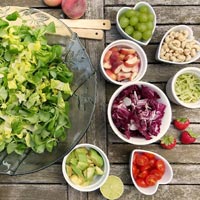 From around the age of 6 months, your baby will usually start the process of weaning off of milk and begin to eat solid foods, albeit given in puréed or liquidised form initially. This is when parents then need to be mindful of their child’s nutritional needs and this is even more pertinent when bringing up a child as a vegetarian.
From around the age of 6 months, your baby will usually start the process of weaning off of milk and begin to eat solid foods, albeit given in puréed or liquidised form initially. This is when parents then need to be mindful of their child’s nutritional needs and this is even more pertinent when bringing up a child as a vegetarian.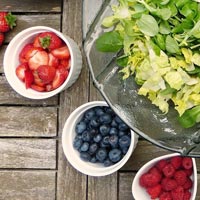 Well, tofu and other soya products will contain good quantities of protein.
Well, tofu and other soya products will contain good quantities of protein. Iron is essential for growing children and can be found in many of the foods mentioned above. That said, it’s worth mentioning that some foods block the absorption of iron. Such foods include tea as well as whole grains and legumes containing ‘phytates’, dairy products containing ‘casein’ and eggs and dairy products that contain particular forms of calcium. The simple solution to many of these is as follows:
Iron is essential for growing children and can be found in many of the foods mentioned above. That said, it’s worth mentioning that some foods block the absorption of iron. Such foods include tea as well as whole grains and legumes containing ‘phytates’, dairy products containing ‘casein’ and eggs and dairy products that contain particular forms of calcium. The simple solution to many of these is as follows: